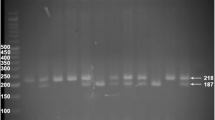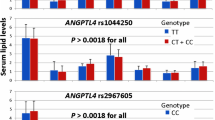Abstract
Scavenger receptor type B (SR-BI) is a receptor that binds both native and altered lipoproteins. It was revealed to facilitate utilization of high-density lipoprotein HDL and significantly affect the reverse transport of cholesterol. Therefore, the objectives were to identify the possible role of the genetic variant rs4238001 in patients with myocardial infarction (MI) on serum lipid level, and how this variant could impact the response of rosuvastatin drug. The genotyping of the rs4238001 genetic polymorphism of the SR-B1 gene was performed in 300 participants, including 150 MI patients treated with 20mg/day/4 weeks of rosuvastatin and 150 healthy control using Taq man probes (FAM and VIC) by Real-time PCR technique. The concentrations of the lipid profile were evaluated. The significance of the anthropometric data was revealed in the ejection fraction and smoking status (p < 0.05) between groups. The lipid profile shows either significant differences between control and MI patients (pre-treatment) or between pre-and post-treatment of MI patients (p < 0.05), but not HDL-c (p > 0.05). The minor allele frequency MAF% of the T allele and TT genotype were more frequent in MI patients than in controls (P = 0.173; OR = 3.62; 95% CI = 0.74–17.64). CC genotype was found to be associated with response to rosuvastatin therapy with a change of % (29.08 ± 53.2; p = 0.021). In the Iraqi population, the rs4238001 polymorphism of the SR-B1 gene is associated with variations in serum lipids, and the CC genotype of the SNP is related to higher HDL-C in the lipid-lowering rosuvastatin response.
Similar content being viewed by others
Abbreviations
- (SR-BI):
-
Scavenger receptor type B
- MI:
-
Myocardial infarction
- TC:
-
Total cholesterol
- TG:
-
Triglyceride
- LDL:
-
Low-density lipoprotein
- HDL:
-
High-density lipoprotein
- VLDL:
-
Very low-density lipoprotein
- IHD:
-
Ischemic heart disease
- (STEMI):
-
ST-elevation myocardial infarction
- (NSTEMI):
-
Non-ST-elevation myocardial infarction
- (SNP):
-
Single nucleotide polymorphisms
- OR:
-
Odd ratio
- CI:
-
Confidence interval
- (ICIMT):
-
Internal carotid intimal-medial thickness
- MI-b:
-
Myocardial infarction patients at baseline
- MI-t:
-
Myocardial infarction patients after 20mg/ day/4 weeks of rosuvastatin therapy
- BMI:
-
Body mass index
- SBP:
-
Systolic blood pressure
- DBP:
-
Diastolic blood pressure
- MAF:
-
Minor allele frequency
- HWE:
-
Hardy–Weinberg Equilibrium
References
Acton S, Osgood D, Donoghue M (1999) Association of polymorphisms at the SR-BI gene locus with plasma lipid levels and body mass index in a white population. Arterioscler Thromb Vasc Biol 19(7):1734–1743
Apple FS, Sandoval Y, Jaffe AS (2017) Cardiac troponin assays: guide to understanding analytical characteristics and their impact on clinical care. Clin Chem 63(1):73–81
Çaykara B, Tokat B, Coşkunpınar E (2021) Investigation of scavenger receptor class B type I gene variants in patients with coronary heart disease with a history of early myocardial infarction. Turk Kardiyoloji Dernegi Arsivi 49(8):641
Cerda Á, Genvigir FD, Arazi SS (2010) Influence of SCARB1 polymorphisms on serum lipids of hypercholesterolemic individuals treated with atorvastatin. Clin Chim Acta 411(9–10):631–7
Connelly MA, de la Llera-Moya M, Monzo P (2001) Analysis of chimeric receptors shows that multiple distinct functional activities of scavenger receptor, class B, type I (SR-BI), are localized to the extracellular receptor domain. Biochemistry 40(17):5249–59
Faam B, Daneshpour MS, Hedayati M (2014) The age effect on the association between the scavenger receptor class B type I (SR-BI) polymorphism and HDL-C level: Tehran Lipid and Glucose Study. Endocr Res 39(3):91–3
Filizfidan M, Pence S, Çaykara B (2019) Investigation of SR-BI gene rs4238001 and rs5888 polymorphisms prevalence and effects on Turkish patients with metabolic syndrome. Turk J Biochem 45(4):435–41
Fox CS, Cupples LA, Chazaro I (2004) Genomewide linkage analysis for internal carotid artery intimal medial thickness: evidence for linkage to chromosome 12. Am J Hum Genet 74(2):253–61
Goodarzynejad H, Boroumand M, Behmanesh M (2016) The rs5888 single nucleotide polymorphism in scavenger receptor class B type 1 (SCARB1) gene and the risk of premature coronary artery disease: a case-control study. Lipids Health Dis 15(1):1–9
Liu Y, Ordovas JM, Gao G (2008) The SCARB1 gene is associated with lipid response to dietary and pharmacological interventions. J Hum Genet 53:709–717
Manichaikul A, Wang XQ, Musani SK (2015) Association of the lipoprotein receptor SCARB1 common missense variant rs4238001 with incident coronary heart disease. PloS one 10(5):e0125497
McCarthy JJ, Lehner T, Reeves C (2003) Association of genetic variants in the HDL receptor, SR-B1, with abnormal lipids in women with coronary artery disease. J Med Genet 40(6):453–8
Mineo C, Shaul PW (2012) Functions of scavenger receptor class B, type I in atherosclerosis. Curr Opin Lipidol 23(5):487–93
Pérez-Martínez P, JvM O, López-Miranda J, Gómez P, Marín C, Moreno J (2003) Polymorphism exon 1 variant at the locus of the scavenger receptor class B type I gene: influence on plasma LDL cholesterol in healthy subjects during the consumption of diets with different fat contents. Am J Clin Nutr 77:809–813
Pérez-Martínez P, Pérez-Jiménez F, Bellido C (2005) A polymorphism exon 1 variant at the locus of the scavenger receptor class B type I (SCARB1) gene is associated with differences in insulin sensitivity in healthy people during the consumption of an olive oil-rich diet. J Clin Endocrinol Metab 90(4):2297–300
Rejeb J, Omezzine A, Boumaiza I (2012) Association of three polymorphisms of scavenger receptor class BI gene (exon8, exon1, intron5) with coronary stenosis in a coronary Tunisian population. Gene 511(2):383–8
Ritsch A, Sonderegger G, Sandhofer A (2007) Scavenger receptor class B type I polymorphisms and peripheral arterial disease. Metabolism 56(8):1135–41
Roberts CG, Shen H, Mitchell BD (2007) Variants in the scavenger receptor class B type I gene are associated with HDL cholesterol levels in younger women. Hum Hered 64(2):107–113
Rodríguez-Esparragón F, Rodríguez-Pérez JC, Hernández-Trujillo Y (2005) Allelic variants of the human scavenger receptor class B type 1 and paraoxonase 1 on coronary heart disease: genotype-phenotype correlations. Arterioscler, Thromb Vasc Biol 25(4):854–60
Shen WJ, Asthana S, Kraemer FB, Azhar S (2018) Scavenger receptor B type 1: expression, molecular regulation, and cholesterol transport function. J Lipid Res 59(7):1114–31
Singh AK , Jat RK (2021). Myocardial Infarction. Himalayan Journal of Health Sciences:16–32
Tai ES, Adiconis XI, Ordovas JM (2003) Polymorphisms at the SRBI locus are associated with lipoprotein levels in subjects with heterozygous familial hypercholesterolemia. Clin Genet 63(1):53–58
West M, Greason E, Kolmakova A (2009) Scavenger receptor class B type I protein as an independent predictor of HDL cholesterol levels in subjects with hyperalphalipoproteinemia. J Clin Endocrinol Metab 94:1451–1457
Zeng TT, Tang DJ, Ye YX, Su J (2017) Influence of SCARB1 gene SNPs on serum lipid levels and susceptibility to coronary heart disease and cerebral infarction in a Chinese population. Gene 30(626):319–325
Funding
The authors have not disclosed any funding.
Author information
Authors and Affiliations
Contributions
SYA Blood sample collection, genetic testing methodology, data collection, interpretation, statistics, and manuscript handling. HSA and FTS Investigation, writing, and editing.
Corresponding author
Ethics declarations
Competing interests
The authors declare no competing interests.
Additional information
Publisher's Note
Springer Nature remains neutral with regard to jurisdictional claims in published maps and institutional affiliations.
Rights and permissions
Springer Nature or its licensor (e.g. a society or other partner) holds exclusive rights to this article under a publishing agreement with the author(s) or other rightsholder(s); author self-archiving of the accepted manuscript version of this article is solely governed by the terms of such publishing agreement and applicable law.
About this article
Cite this article
Abdulfattah, S.Y., Alagely, H.S. & Samawi, F.T. Influence of the rs4238001 Genetic Polymorphism of the SR-B1 Gene on Serum Lipid Levels and Response to Rosuvastatin in Myocardial Infarction Iraqi Patients. Biochem Genet (2023). https://doi.org/10.1007/s10528-023-10613-4
Received:
Accepted:
Published:
DOI: https://doi.org/10.1007/s10528-023-10613-4




